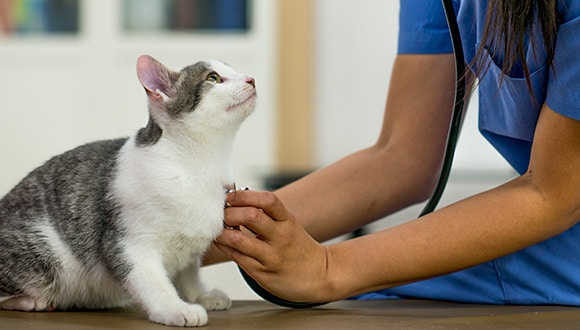Pet insurance: What are you covered for?
Published August 2023 | 5 min read
Expert contributors Noriel Williams, veterinarian; Donna Gilroy, veterinary practice manager; Rebecca Thomsen, head of product, Diversified Business at HCF
Words by Angela Tufvesson
Worrying about expensive vet bills when your pet is unwell is stressful and can impact decisions you make about their care. Here’s how pet insurance can help.
Owning a dog or a cat can bring companionship, better mental health and lots of cuddles – but looking after your pet doesn’t always come cheap, and that’s where having pet insurance can help.
Dog owners spend an average of more than $25,000 over the lifespan of their pet, and for cat owners the costs can be as high as $17,000 for a four-legged friend that may live for up to 20 years, according to research. A hefty chunk of these costs often come from vet bills for routine checks, treatments and vaccinations, as well as unexpected costs for accidental injuries or serious illnesses.
For a number of Australians with dogs or cats, pet insurance can help provide protection against vet bills for unexpected accidental injuries and illnesses.
"If your pet requires hospitalisation or specialist care, your out-of-pocket vet bills can go from the cost of annual vaccinations to easily $5,000, overnight," explains veterinarian Dr Noriel Williams, founder of Melbourne-based mobile veterinary service Cosy Paws Vet Care.

How does pet insurance work?
Pet insurance works by helping to cover the cost of unexpected eligible vet expenses.
A pet insurance policy may cover your pet for serious illnesses, chronic conditions and surgical procedures. The same goes for mishaps like snake bites, tickparalysis, poisoning, torn nails and eye trauma, which can be especially helpful if your pet likes getting into trouble.
Depending on your policy, your pet may also be eligible for some money back on items like vaccinations, flea and worm treatments, as well as regular check-ups.
"Some dogs are injury-prone, just like people, [and] some breeds are known to be escape artists," says Donna Gilroy, practice manager at Noah's Ark Veterinary Services in NSW.
If that sounds like your furry friend, then having pet insurance may be beneficial.
How can pet insurance reduce vet costs?
Pet insurance is particularly helpful when you’re confronted with large, unexpected vet bills. Treatments for snake bites, cancer, cruciate ligament surgery and ingesting foreign objects, for example, can be $2,000 or more.
"Specialist care [for animals] is of such high quality and on par with human healthcare with the surgeries, imaging and diagnostics that can be done, and the standard of care for hospitalisation and emergency is also high. Obviously, all of that comes at a cost," says Dr Williams.
What do you get as an HCF Pet Insurance policyholder?
Our pet insurance can help with the cost of your cat or dog’s eligible vet bills, providing up to 80% back up to a limit of $12,000 per year with the Pet Premium cover.
"We offer GapOnly® as a payment option at participating vet practices, which enables you to claim at the vet and only pay the gap*," explains Rebecca Thomsen, head of product, Diversified Business at HCF.
"If something unexpected happens, GapOnly® can help to reduce eligible out-of-pocket expenses, including large expenses like surgery or cancer treatment."
HCF Pet Insurance members can also connect 24/7 to an experienced Australian registered vet via video call or chat, at no extra cost, with Live Vet Support. Whether it's providing vet advice, setting up at-home treatment plans, or confirming if you need to visit a vet in person, you can get help when you need it, anytime. Terms of Use apply^.

How much is pet insurance?
"Age and breed are the two key factors in working out your premium [which is the amount you pay for the insurance each month], but the coverage – 80% back on your bills – is the same for all breeds," says Rebecca.
Your excess, which is the amount you have to pay if you make a claim on your policy – with HCF Pet Insurance, this ranges from $0 to $200 – will also influence the cost. "If you choose a higher excess, your premium will be lower," she adds.
What does pet insurance not cover?
While there’s no waiting period for specified accidental injuries, Rebecca says illnesses come with a 30-day waiting period, while for cruciate ligament conditions (a condition where the knee joint breaks down, tears or ruptures), a six-month waiting period applies.
However, pre-existing conditions aren’t covered by HCF Pet Insurance. "If your pet already has a condition, or a condition arises during a waiting period, that condition won’t be covered," says Rebecca. It’s also worth noting that some other exclusions apply.
When is the best time to get pet insurance?
Getting pet insurance when your furry friend is a puppy or kitten and continuing it throughout their life is a good way to reduce the chance of your pet developing pre-existing conditions prior to the start of the pet insurance policy, or during any waiting periods.
Pets as young as eight-weeks-old and as old as nine-years-old can be covered.
Save up to 15% on pet insurance as an HCF member#
We’ll help cover your furry family members with discounted rates on pet insurance. If you have a cat or dog, HCF Pet Insurance can help with vet bills, providing up to 80% back on eligible vet bills.
Related Articles
THE BENEFITS OF PET THERAPY
Here’s how having or playing with a pet can help you recover from illness and stay healthy.
HOW TO BE A BETTER PET OWNER
Learn some basic pet etiquette to help keep your animals healthy, happy and safe.
7 SMART MONEY-SAVING TIPS
How to save money and boost financial fitness – now and into the future.
WAITING PERIODS EXPLAINED
Confused about waiting periods with private health funds? Get the lowdown on how they work and why they exist.
IMPORTANT INFORMATION
* The gap means the difference between the vet’s invoice and the eligible claim benefit under your policy. GapOnly® is a trademark owned by PetSure (Australia) Pty Ltd ABN 95 075 949 923, AFSL 420183 (PetSure).
^ Live Vet Support is a non-insurance service provided by PetSure that gives you 24/7 access to general veterinary telehealth advice for your insured pet(s) via online video or chat, via the Customer Portals owned and operated by PetSure. Live Vet Support is only available while you hold a current HCF Pet Insurance policy. It may be suspended or withdrawn at any time without notice. Live Vet Support should not be used in a medical emergency and cannot provide you with information or advice about your HCF Pet Insurance policy. Access to Live Vet Support consultations is subject to the Customer Portal terms of use. For those terms, and the full terms of use of the service, visit https://petportal-hcf.petsure.com.au/.
# All HCF members are eligible for a member discount of at least 10% on HCF Pet Insurance. HCF Ruby and Diamond members get a 15% discount. Existing Manchester Unity Pet Insurance policies are not eligible for discounts under HCF Thank You. Visit the HCF Thank You page for further information. Where relevant, increased discount will be applied automatically at first renewal after advancement in HCF Thank You tier. To be eligible for the discount members need to have the HCF My Membership app or online member services set up. This offer may be subject to change.
HCF Pet Insurance policies entered into for the first time prior to 21 March 2024 and subsequent renewals of those policies are issued by The Hollard Insurance Company Pty Ltd ABN 78 090 584 473, AFSL 241436, arranged and administered by PetSure (Australia) Pty Ltd ABN 95 075 949 923, AFSL 420183 (PetSure) and promoted and distributed by The Hospitals Contribution Fund of Australia Ltd ABN 68 000 026 746, AFSL 241414 (HCF). HCF Pet Insurance policies entered into for the first time on or after 21 March 2024 and subsequent renewals of those policies are issued by PetSure and promoted and distributed by HCF. Any advice provided is general only and does not take into account your individual objectives, financial situation or needs. Please consider the Product Disclosure Statement (PDS) to ensure this product meets your needs before purchasing, or choosing to continue with the product. PDS and Target Market Determination available at hcf.com.au/petinsurance.
HCF Pet Insurance is not part of HCF's health insurance business. Please do not assume that pet insurance and health insurance are similar. HCF may receive a commission of up to 13% of the premium for promoting HCF Pet Insurance Policies. HCF sales agents are paid a salary or wages but do not receive a commission or other payments attributable to the sale of HCF Pet Insurance. For more information, contact HCF on 1800 630 681 or petinsurance@hcf.com.au.
Manchester Unity Pet Insurance is issued by The Hollard Insurance Company Pty Ltd ABN 78 090 584 473; AFSL 241436, is distributed by The Hospitals Contribution Fund of Australia Limited ABN 68 000 026 746, AFSL 241414, and arranged and administered by PetSure (Australia) Pty Ltd ABN 95 075 949 923, AFSL 420183. Manchester Unity Pet Insurance is closed to new customers and is only available for renewal by existing customers. Manchester Unity Pet Insurance is not part of HCF's health insurance business. Please do not assume that pet insurance and health insurance are similar. Any advice provided is general only and does not take into account your individual objectives, financial situation or needs. Please consider the Product Disclosure Statement (PDS) and Target Market Determination (TMD) to ensure this product meets your needs before you renew your cover. Manchester Unity Pet Insurance PDS and TMD available at hcf.com.au/petinsurance.
This communication contains information which is copyright to The Hospitals Contribution Fund of Australia Limited (HCF). It should not be copied, disclosed or distributed without the authority of HCF. Except as required by law, HCF does not represent, warrant and/or guarantee that this communication is free from errors, virus, interception or interference. All reasonable efforts have been taken to ensure the accuracy of material contained on this website. It’s not intended that this website be comprehensive or render advice. HCF members should rely on authoritative advice they seek from qualified practitioners in the health and medical fields as the information provided on this website is general information only and may not be suitable to individual circumstances or health needs. Please check with your health professional before making any dietary, medical or other health decisions as a result of reading this website.